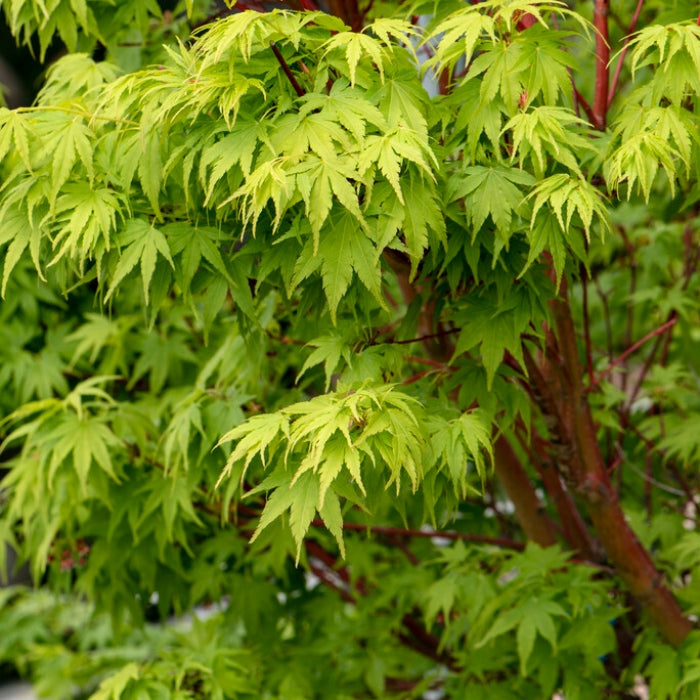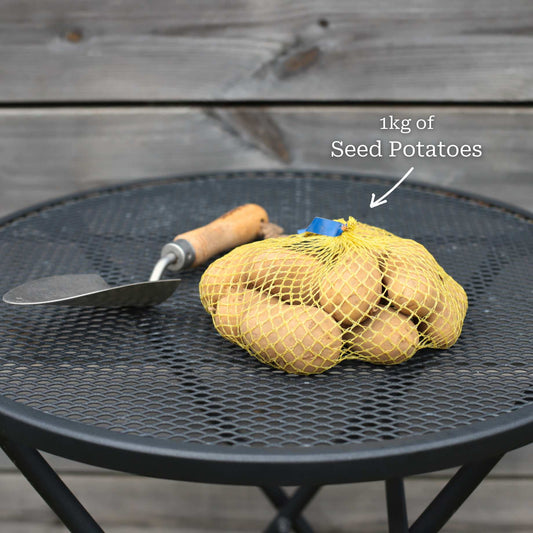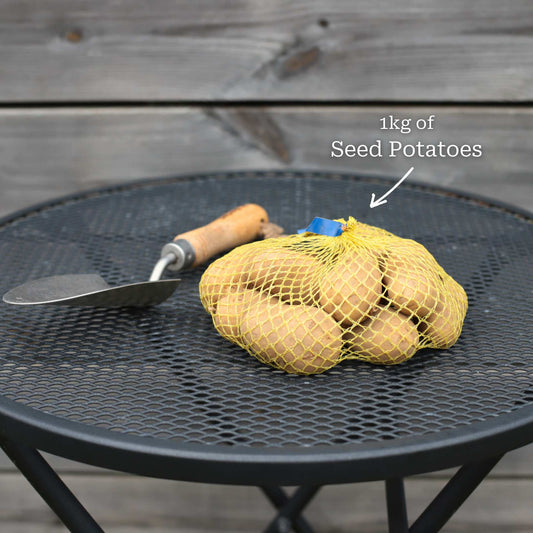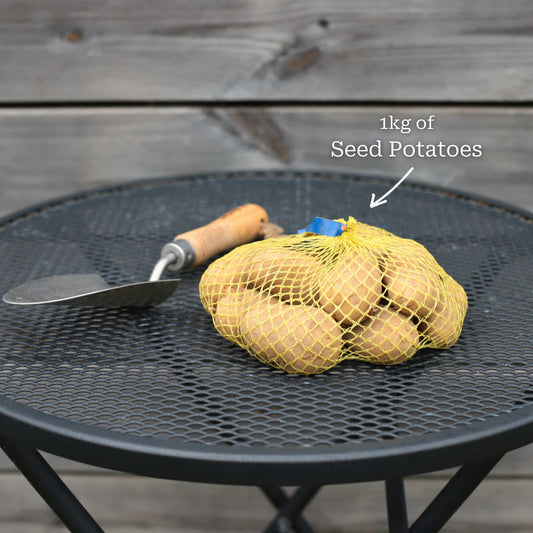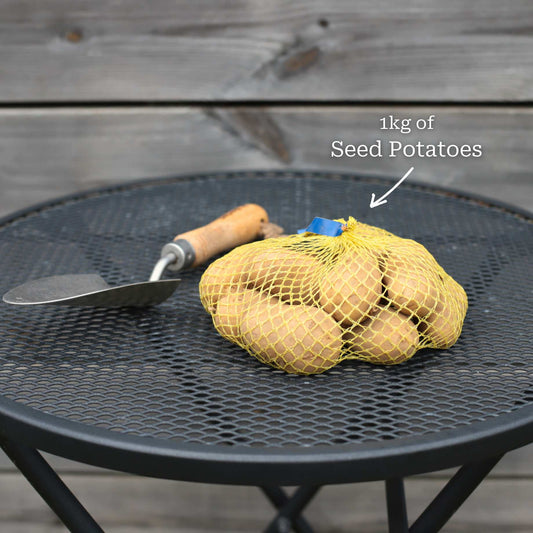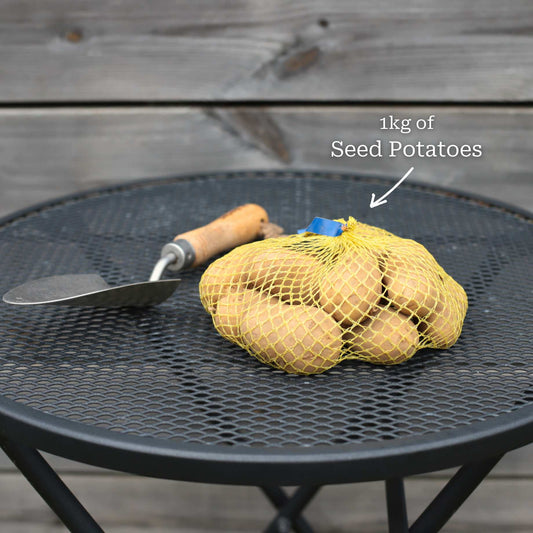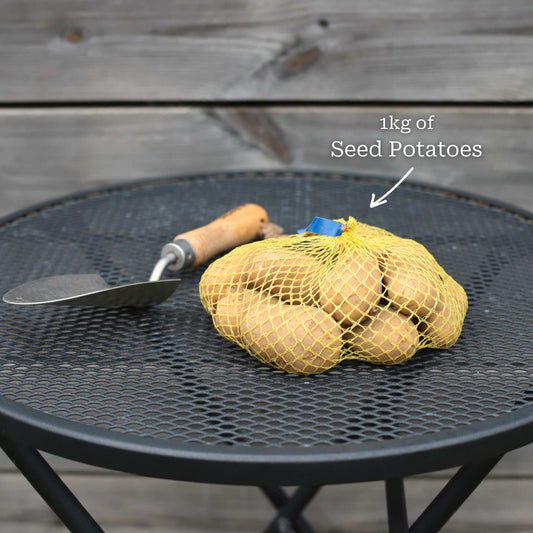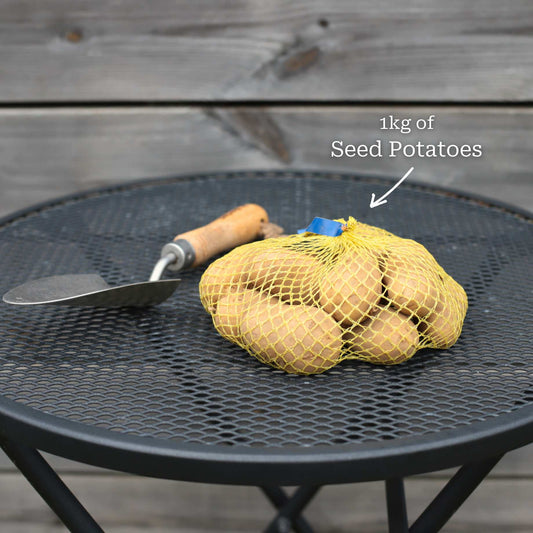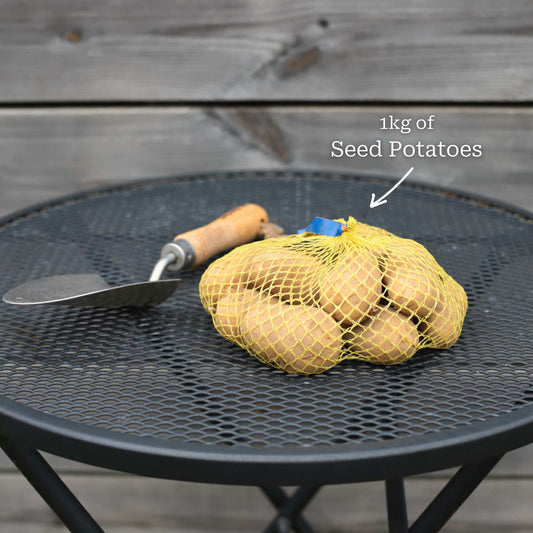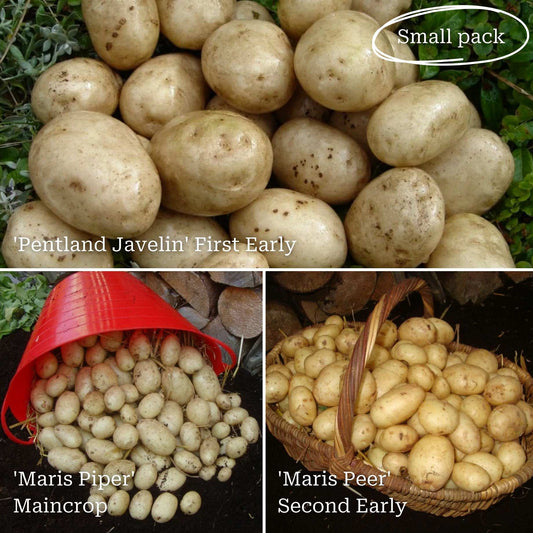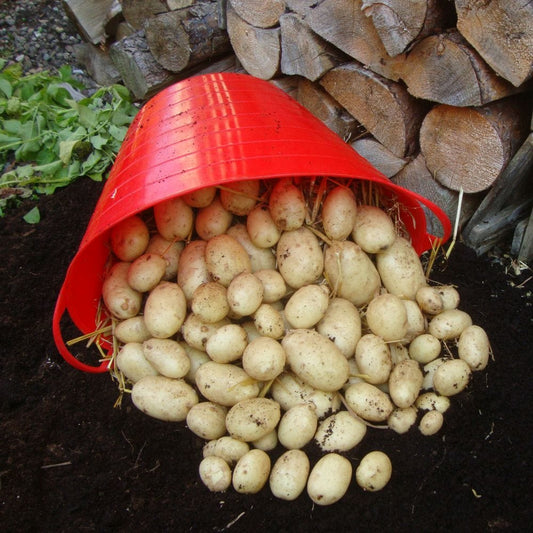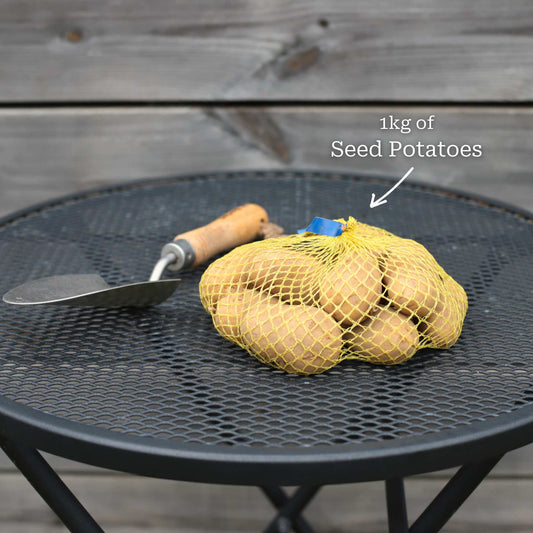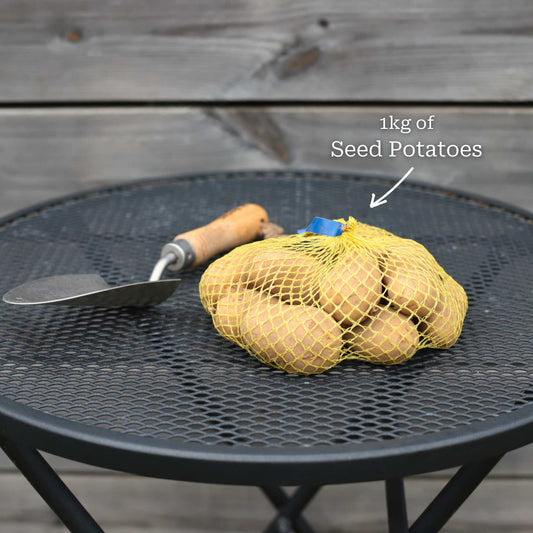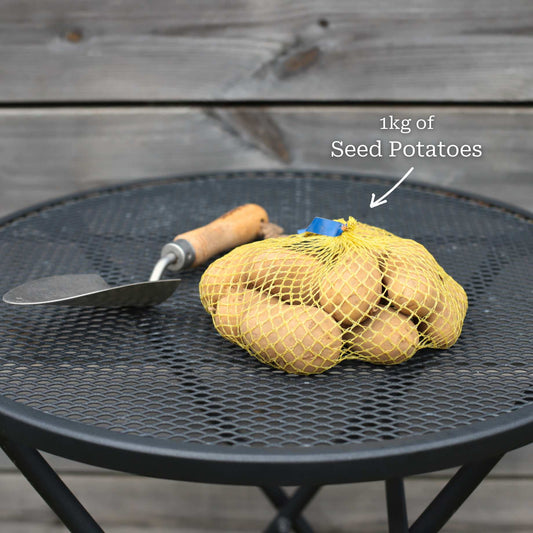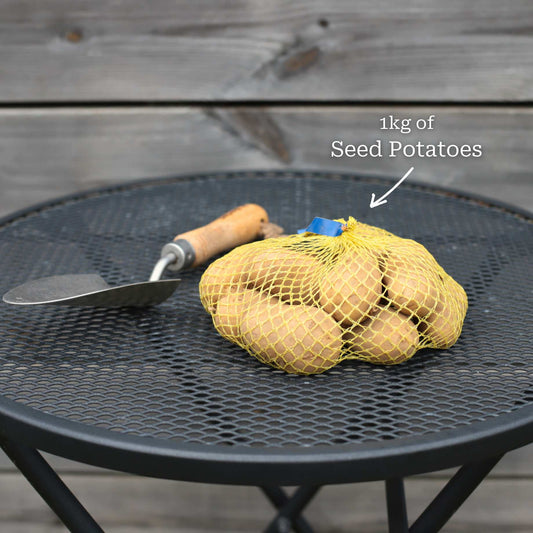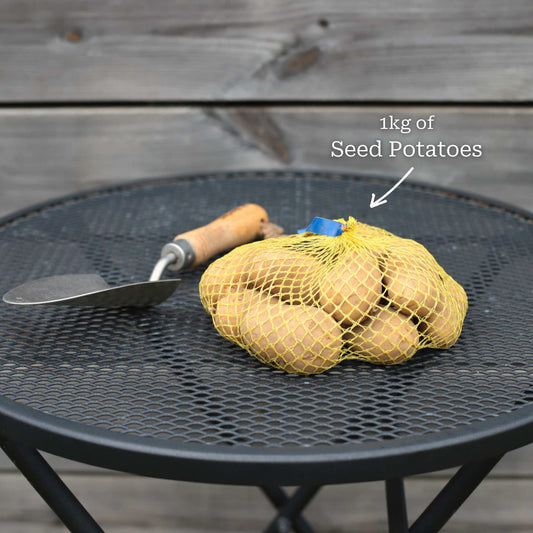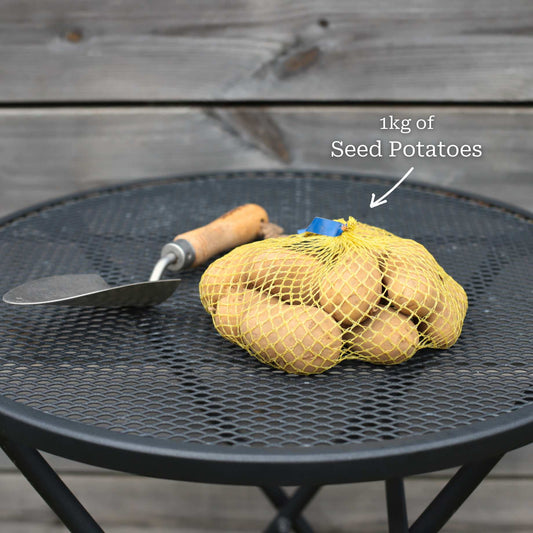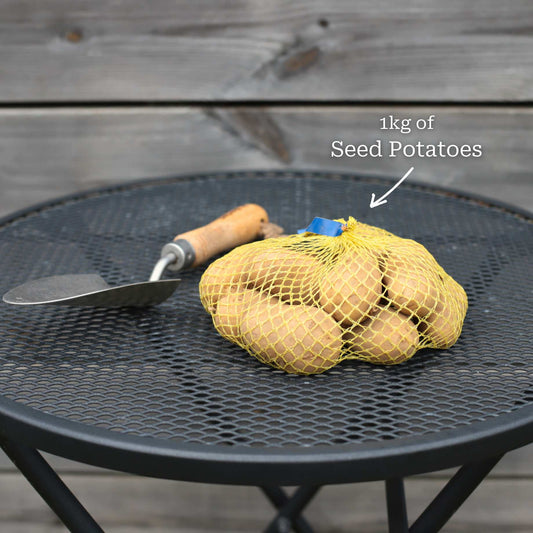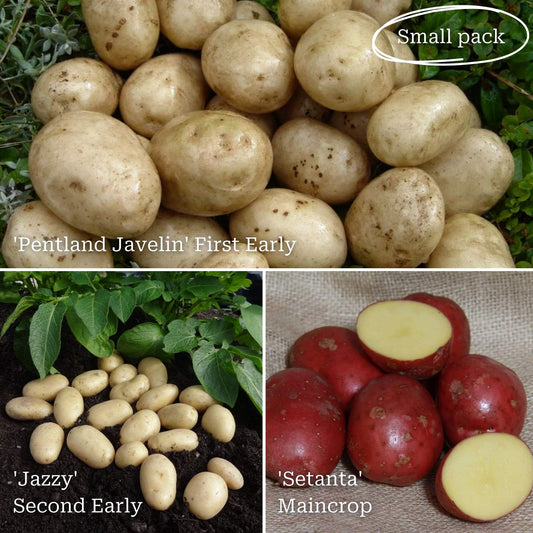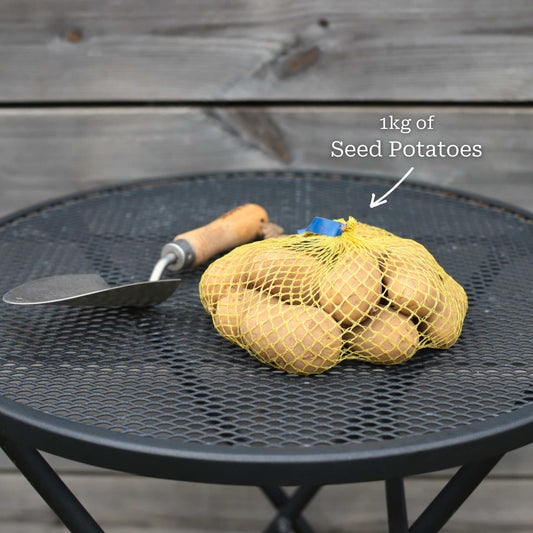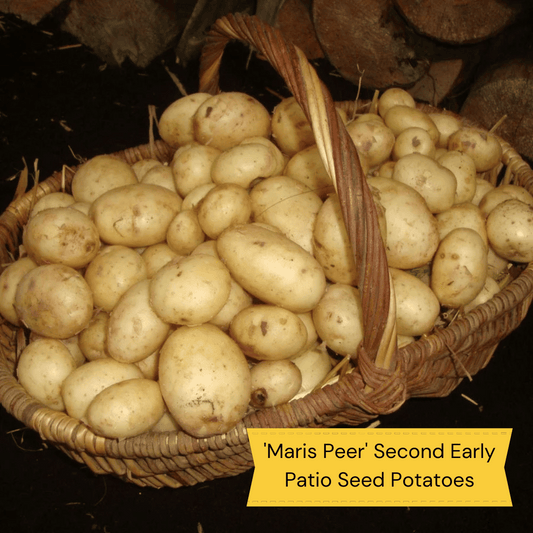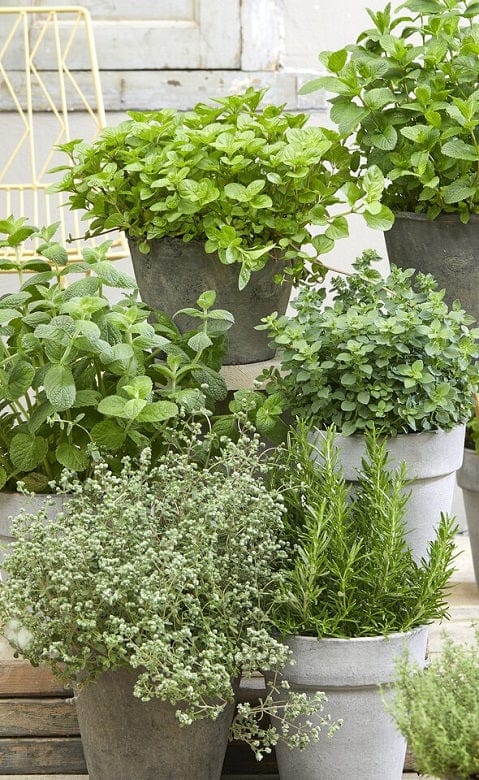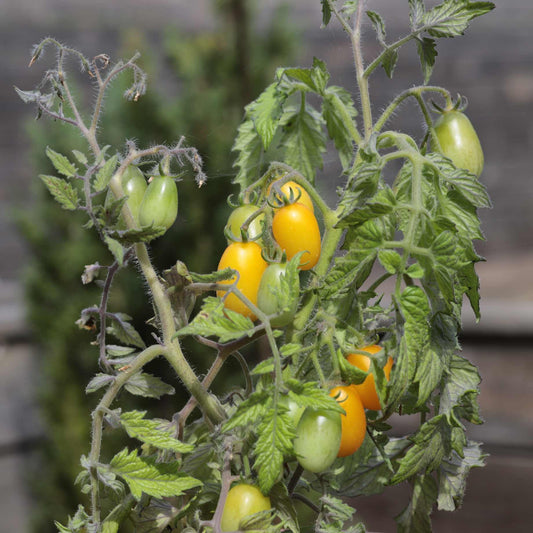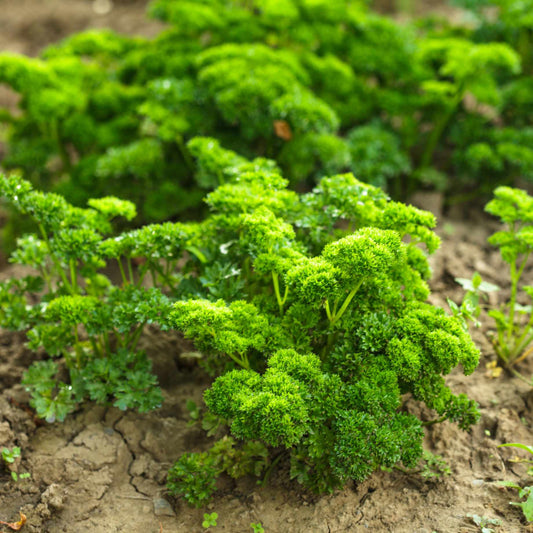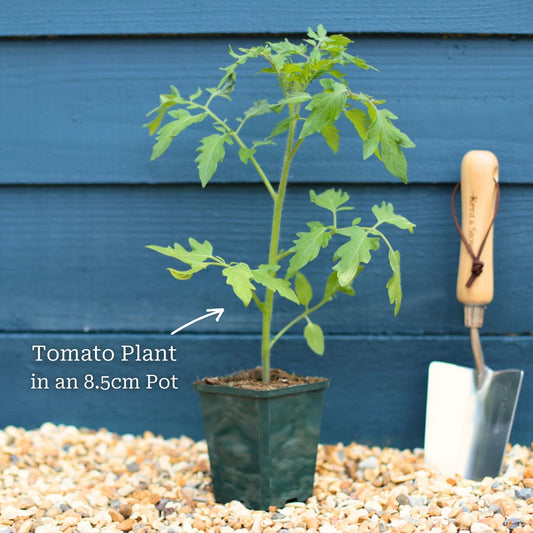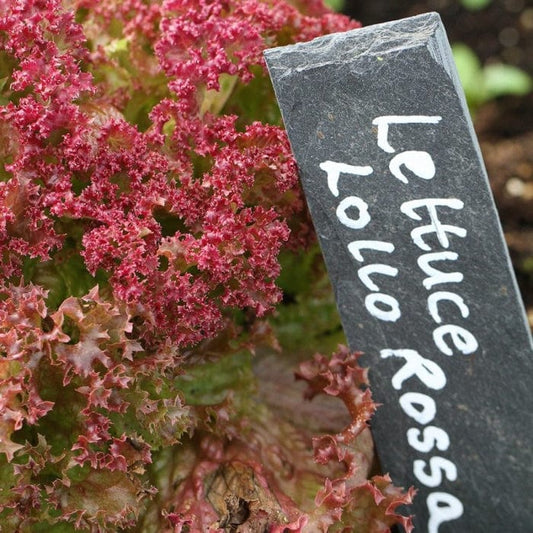Collection: Vegetable Plants
Turn food miles into mere metres by growing your very own fresh vegetables. Forget the will-they-won’t-they palaver of seeds. We’ll send you only the strongest young plants to get your patch off to a flying start. They’re all grown with love and sent to you at the perfect time for planting. Get started with our vegetable collections!
Need help picking?-
Regular price From £5Regular price
£7Sale price From £5'Desiree' Maincrop Seed Potatoes
Highly desire(e)d potatoes!
- Creamy-textured spuds with lovely earthiness
- RHS Award of Garden Merit winner
- Slice into wedges or grate and make röstis
- Maincrop - harvest from August
2 options available
-
Regular price From £5Regular price
£7Sale price From £5'Cara' Maincrop Seed Potatoes
Yields you'll scarcely believe
- Potatoes with creamy flesh and sweet flavour
- Huge yields virtually guaranteed
- Makes unbeatable chips and wedges
- Maincrop - harvest from August
2 options available
-
Regular price From £7Regular price Sale price From £7
'Charlotte' Second Early Salad Seed Potatoes
The UK's fave salad potato
- A marriage of earthy, nutty and sweet flavour
- RHS Award of Garden Merit winner
- Cube, sauté and sprinkle with sea salt
- Second early - ready from July
2 options available
-
Regular price From £5Regular price
£7Sale price From £5'Maris Peer' Second Early Patio Seed Potatoes
Supercharge your potato salads
- Delicate, subtle flavour (and a waxy texture)
- Ideal for patio planters and potato sacks
- Steam or boil and lather in butter
- Second early - ready from July
2 options available
-
Regular price From £5Regular price
£7Sale price From £5'Setanta' Maincrop Seed Potatoes
Incredible disease resistance!
- Fluffy and floury with a lovely buttery taste
- Excellent resistance to tuber blight
- Makes the best jacket potatoes and chips
- Maincrop - harvest from August
2 options available
-
Regular price From £5Regular price
£7Sale price From £5'Rocket' First Early Patio Seed Potatoes
A show bench staple
- Delicate and mild new potato flavour
- Idea for containers
- Steam, then top with butter, lemon and herbs
- First early - ready from June and July
2 options available
-
Regular price From £5Regular price
£7Sale price From £5'Caledonian Rose' Maincrop Seed Potatoes
Easy to grow all-rounder
- The perfect balance between floury and waxy
- Easy to grow and very disease resistant
- So versatile! Boil, roast, mash or chip!
- Maincrop - harvest from August
2 options available
-
Regular price From £5Regular price
£7Sale price From £5'Kestrel' Second Early Seed Potatoes
Spuds with a unique violet blush
- Subtly sweet with a creamy texture
- Great for beginners, so easy to grow
- Fantastic for chips and roasts
- Second early - ready from July
2 options available
-
Regular price From £15Regular price
£17Sale price From £15Full Season Seed Potato Pack | Growers' Choice
Potatoes for months (and months)
- Includes 'Maris Peer', 'Maris Piper' and more
- Harvest delicious potatoes month after month
- Bake, pan-roast or whack in the air fryer
- Harvest from June to October
1 option available
-
Regular price From £5Regular price
£7Sale price From £5'Maris Piper' Maincrop Seed Potatoes
The UK's most widely grown spud
- Pleasantly mild earthiness with buttery notes
- RHS Award of Garden Merit winner
- Brilliant roasted, chipped or baked
- Maincrop - harvest from August
2 options available
-
Regular price From £5Regular price
£7Sale price From £5'Swift' First Early Seed Potatoes
Blink and they've already grown!
- A mild-tasting spud that's ideal for salads
- Amongst the quickest-maturing potatoes
- Perfect for boiling, salads and dauphinoise
- First early - ready from June and July
1 option available
-
Regular price From £5Regular price
£7Sale price From £5'Java' Maincrop Seed Potatoes
The perfect potato? Could be!
- Creamy and flavourful waxy potatoes
- Amazing blight resistance!
- Roast in duck fat and sprinkle with rosemary
- Maincrop - harvest from August
2 options available
-
Regular price From £5Regular price
£7Sale price From £5'Jazzy' Second Early Salad Seed Potatoes
Yields warranting a second trug!
- Boasts buttery notes with hints of sweetness
- RHS Award of Garden Merit winner
- Butter your boiled tatties and add fresh mint
- Second early - ready from July
2 options available
-
Regular price From £5Regular price
£7Sale price From £5'Sharpe's Express' First Early Seed Potatoes
Heirloom variety dating to 1900
- Traditional new potato taste
- RHS Award of Garden Merit winner
- Boil and serve in a summer potato salad
- First early - ready from June and July
2 options available
-
Regular price From £5Regular price
£7Sale price From £5'Pentland Javelin' First Early Seed Potatoes
One seriously heavy cropper
- Exceptional flavour (leaves you wanting more)
- Incredibly easy to grow, great for beginners
- Boil and serve with butter and herbs
- First early - ready from June and July
2 options available
-
Regular price From £5Regular price
£7Sale price From £5'Red Duke Of York' First Early Seed Potatoes
Like 'Duke of York' but better!
- Punchy, powerful flavour with floury flesh
- RHS Award of Garden Merit winner
- Perfect for creamy potato dauphinoise
- First early - ready from June and July
2 options available
-
Regular price From £5Regular price
£7Sale price From £5'King Edward' Maincrop Seed Potatoes
A beloved heirloom variety
- Floury, fluffy flesh with a buttery taste
- RHS Award of Garden Merit winner
- Bake and top your jacket with cheesy beans
- Maincrop - harvest from August
2 options available
-
Regular price From £15Regular price
£17Sale price From £15Seed Potato Starter Pack | Ideal for Beginners | Growers' Choice
Grow your very first spuds
- Includes 'Jazzy', 'Setanta' and more
- Varieties selected for trouble-free harvests
- Ideal for boiling, mashing and chipping
- Harvest from June to October
2 options available
-
Regular price From £5Regular price
£7Sale price From £5'Rooster' Maincrop Seed Potatoes
An exceptional all-rounder
- Distinctly nutty taste with subtle sweetness
- RHS Award of Garden Merit winner
- Ideal for mashing and roasting
- Maincrop - harvest from August
2 options available
-
Regular price £15Regular price
£17Sale price £15Container Growing Seed Potato Pack | Growers' Choice
Taters from your terrace
- Includes 'Charlotte', 'Jazzy' and more
- Varieties well-suited to pot growing
- Make a tray of delicious smashed potatoes
- Harvest from July to August
1 option available
-
Regular price From £5Regular price
£8Sale price From £5Garlic Plants
Unlock new levels of flavour
- Reliable in the UK climate
- Exceptional taste and aroma, keeps for months
- Grow in raised beds, pots or borders
- Harvest from July to August
Currently out of stock
-
Regular price From £8Regular price
£14Sale price From £8'Maccabi' Grafted Red Sweet Pepper Plant
Grow your own sweet peppers
- Exceptionally crunchy and refreshing
- Grafted for up to 75% more fruit
- Rustle up a roasted tomato and chilli soup
- Harvest from June to September
Currently out of stock
-
Regular price From £5Regular price
£10Sale price From £5'Sweet Stem' Broccoli Plants
Brilliant bolt-tolerant broccoli
- Boasts a lovely crunch and good sweetness
- So tender you can eat it raw - no waste!
- Perfect for a hearty soup
- Harvest from July to October
Currently out of stock
-
Regular price From £5Regular price
£8Sale price From £5'Peardrop' Yellow Tomato Plant
Unusually-shaped tomatoes
- A perfect blend of sweetness and acidity
- Grow in pots and hanging baskets
- The ideal summertime snack!
- Pick your tomatoes from July to October
Currently out of stock
-
Regular price From £5Regular price
£8Sale price From £5Curly Parsley Plant
A palate-cleansing flavour hit
- Tangy leaves with a clean, peppery taste
- Full of iron (and vitamins A, C and K)
- Elevate your garlic bread game
- Harvest from July to September
Currently out of stock
-
Regular price From £5Regular price
£8Sale price From £5'Shirley' Tomato Plant
The show-worthy salad tomato
- Firm-skinned tomatoes with good sweetness
- RHS Award of Garden Merit winner
- Whip up a tomato and basil soup
- Early to mature (pick from June onwards)
Currently out of stock
-
Regular price From £7Regular price Sale price From £7
'Lollo Rossa' Lettuce Plants
Frilled, flavourful and fabulous
- Crunchy, sweet and slightly nutty
- Needs less watering than other salad leaves
- Wonderful drizzled with balsamic vinegar
- Harvest from June to October
Currently out of stock
Roots' Cotswolds Valley Nursery
Meet Alice
An experienced hand from seed to harvest
Alice is our vegetable grower here at Roots, and has a wealth of experience growing from seed through to harvest. With a background having worked at both the National Trust and Shakespeare’s gardens, Alice pairs time-honoured horticultural traditions alongside the very best modern techniques in our fabulous, purpose-built nursery in Evesham.
Need help picking?

Which vegetable plants should I grow?
The vegetable plants you choose to grow will depend on a number of factors, from your personal palate to the type of soil you have and the climatic conditions of where you live. If you live on the south coast, for instance, and your garden is a sun trap, then vegetables like tomatoes, chillies and cucumbers are a good bet. Conversely, if you live in a colder part of the country and your garden is more shaded, then leafy greens like spinach and kale are your best friend. If you only have a small garden or patio to work with, then opt for beetroot, salad potatoes and dwarf carrot varieties (like ‘Chantenay’, for instance) which can all be grown in containers or grow bags. Lastly, if you want vegetables that both taste good and look good in the ground doing so, go for peas and beans, thanks to their charming flowers.

Caring for your vegetable plants
While specific care requirements can vary slightly from plant to plant, there are some general pointers that are fairly universal, whatever it is you’re growing. Moist but well-drained soil (or compost if you’re container growing) is best, while vegetables will typically be most productive grown in full sunshine conditions (at least six hours of direct sunlight per day). If your soil is poor or a bit heavy, consider amending it with some organic compost or well-rotted manure. For more specific information on a particular vegetable, check out our compendium of vegetable grow guides.

Harvesting and using your vegetable plants
Part of the fun of growing vegetables is the growing in and of itself. But the other good part is getting to enjoy the fruits vegetables of your labour. You can check out our planting and harvest calendar for more information on when your vegetables will be ready to go. We also have a bunch of recipes you can follow to make use of your homegrown produce. From smacked cucumber salads to cumin and chilli-roasted carrots, there’s something for even the pickiest of eaters.
Vegetable Planting FAQs
What month is best to plant vegetables?
The majority of vegetables are sown in spring (March to May). Our recommendation is to plant veg after the last frost, which is usually at the beginning of June, but if you're interested in autumn and winter planting, we’ve got you covered!
How do you prepare the soil for a vegetable garden?
Soil preparation consists of three main steps: weeding, enriching the soil with organic or mineral matter and working or turning the soil. Get to know your soil a little better.
Where should I plant my vegetable garden?
Location is key and it’s all about finding a ‘sweet spot’ that gets at least six hours of direct sunlight a day. Ensure the area you choose has good drainage and easy access to a water source so you aren’t lugging your watering can around and getting more soaked than the veggies (we’ve all been there). Many vegetables can also be grown in pots on a patio, balcony or in a garden. Easily pleased.
When should I fertilise my vegetables?
We would advise feeding early on in the growing season and remember to ‘keep calm and carry on’ when fruit begins to appear, as fertiliser is still needed at this stage to ensure continued growth.
Do I need companion plants?
A companion plant is planted near a vegetable plant to either discourage pests from attacking it (mint, chives, lavender), attract them away from it (nasturtiums, marigolds) or attract predators that eat pests (marigolds, fennel).
How often should a vegetable garden be watered?
The UK is renowned for its rainy days, but chances are rain alone won’t be enough and you’ll need to give your growing friends a helping hand. Make sure you’re giving your plants roughly 2-3 cm of water per week. Unsure if they need a drink? Stick your finger in the soil every day or two; if the top inch is dry, give them water.
Do I need a greenhouse to grow vegetables?
No greenhouse? No problem. You can grow an array of vegetables from just a few pots on your patio or even in a small garden. Take a look at our favourite greenhouse alternatives.
I’m a beginner, what are some of the easiest vegetables to grow?
Lettuce, radishes and peas are your best friends. We also believe you’ll thoroughly enjoy the company of green beans, beetroots and carrots. Don’t just take our word for it, have a browse yourself.
How do I know when it’s time to harvest?
Follow the plant's lead. Typically, ripe vegetables are vibrantly coloured, tender, and easy to pull away from the plant. Remember: the rule that bigger is better doesn't always apply, especially in the garden.
Do I need to grow vegetables from seed?
There’s nothing quite like growing a plant from a tiny seed but you can also plant seedlings which can be easily planted either inside or outside. Seeds are planted in the ground whereas seedlings are already sprouted from seed before planting.
Can I grow vegetables in pots?
Absolutely! Growing your own vegetables doesn't require a large garden or an allotment - any sunny spot will do.
Happy plants make happy customers
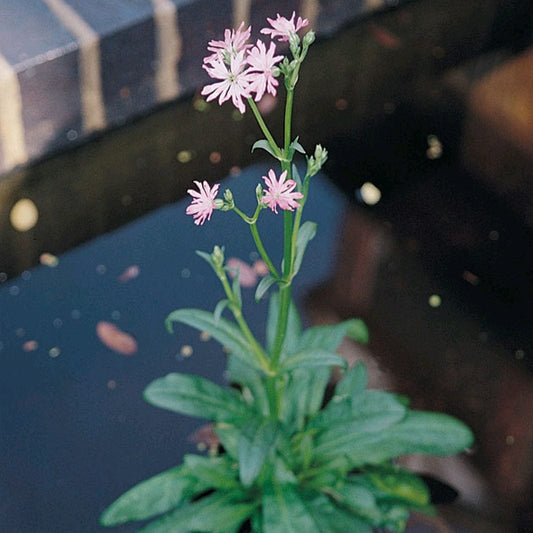
Plants arrived in great condition and very promptly. Well established - much better than the ones I got at my local garden centre.
Monica Spence
| 24 May
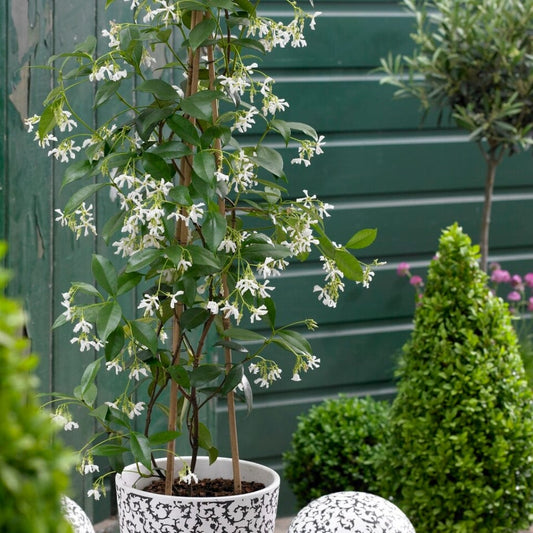
Yet again this company delivered good healthy plants, exactly as shown in photos, well packaged and within delivery time quoted. Recommend!
Jacqueline Burgess
| 2 Jun
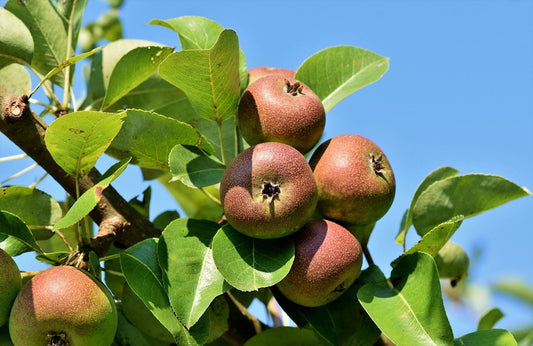
I continue to be so impressed with Roots. Their customer care, knowledge of their subject: from planting hedges to pruning roses and more, has been a great support.
Judy Lane
| 23 Oct
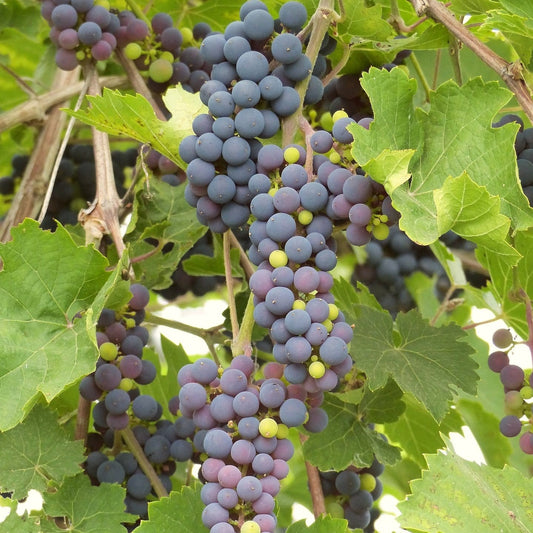
The plant arrived looking vigorously healthy, which brings a smile to your face, extremely well protected in its packaging.
Martyn Hill
| 5 Jul
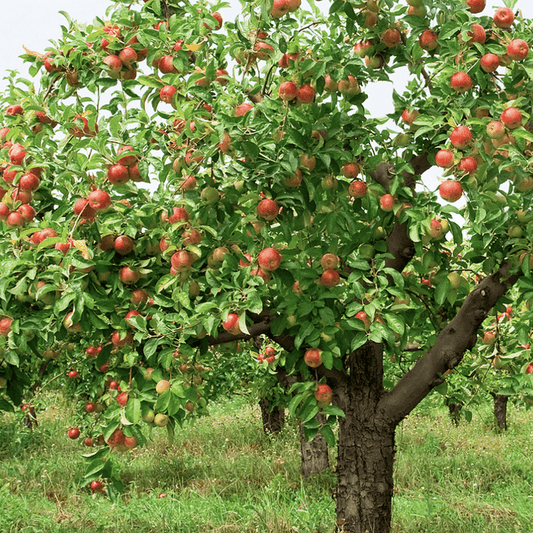
As a non-gardener, I found my whole experience brilliant. Great information & advice available on the website, great range of products & prices are brilliant.
John-Paul
| 22 May

Wonderful plants and great customer service... really surprised to find that the plants are better than those you would get at your local garden centre.
Gavin Wilcock
| 8 Nov
Fighting plastic waste
Delivering fresh from the nursery
Supporting UK growers
